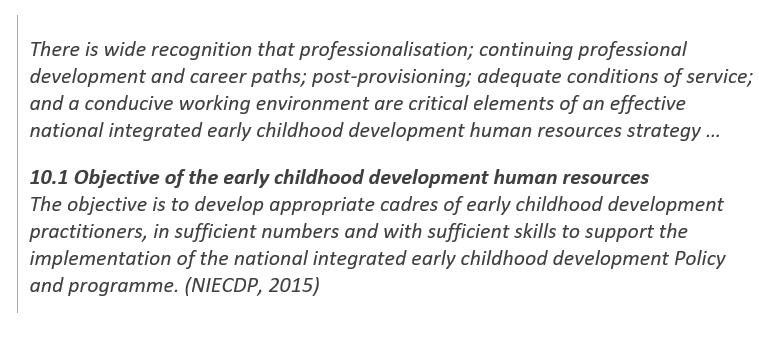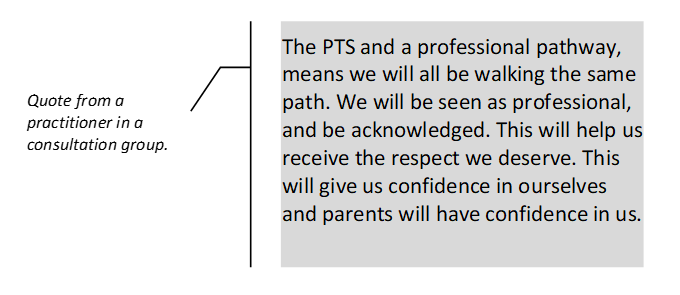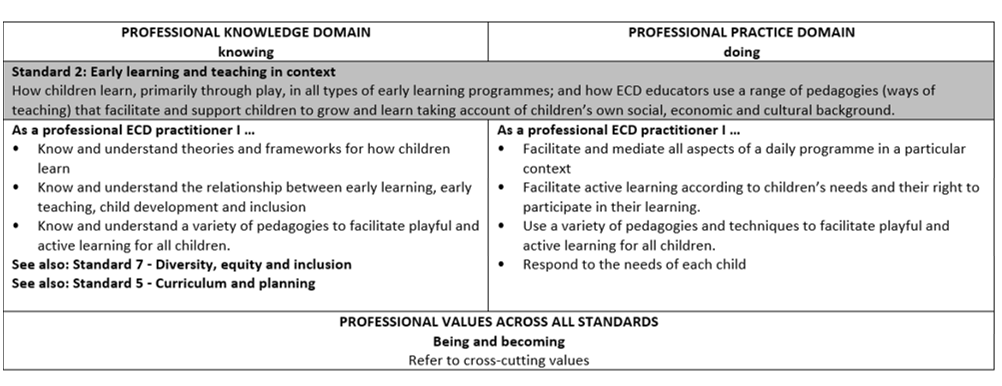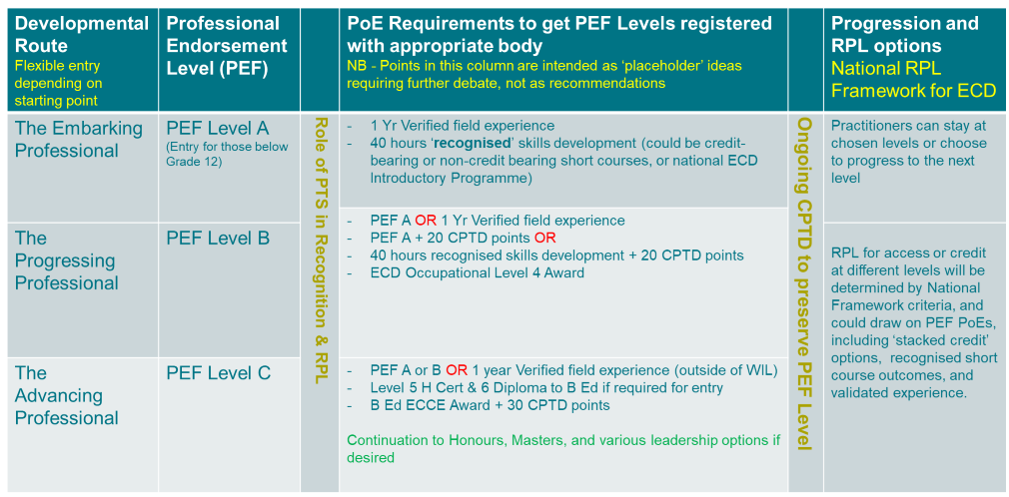

Sheila Drew, F.U.N. Project Leader
Building a professional pathway for early childhood educators
The F.U.N. ECD professional teaching standards team, funded by VVOB and supported by DBE and the South African Council for Educators (SACE), engaged in conversations with key ECD stakeholders, to address a long-standing challenge: the need for professional teaching standards and clearer career pathways for Early Childhood Development (ECD) educators.
In collaboration with ECD Resource and Training Organisations, trainers, practitioners and parents, the goal was to create standards that elevate the profession and help align the South African education system with the demands of quality early learning and care. This initiative forms part of a broader strategy to support ECD educators with clear qualifications, career development opportunities, and professional recognition.
As highlighted in South Africa’s National Integrated ECD Policy (DoS, 2015) professionalisation is critical to the effectiveness of an ECD strategy. The policy acknowledges the need for a skilled and supported workforce to implement successful early childhood programmes, calling for improved professional development, career paths, and working conditions for ECD practitioners.
The National Integrated ECD Policy (DoS. 2015) acknowledges in Chapter 10 that:

What does it mean to be an ECD professional?
ECD in South Africa is largely a private informal sector. Despite the shift of ECD responsibilities from the Department of Social Development to the Department of Basic Education there is no promise of funding for posts or improved conditions of service for ECD practitioners. Most ECD practitioners work in an under-resourced, informal context. These educators work with children aged 0-4 across various settings, including centre-based, home-based, play groups, toy libraries and parent support programmes. This means that ECD educators work with children who have different needs in different contexts which differ from the needs of school-aged children.
The ECD educator workforce has been described as an ‘early emerging profession’ (Ebrahim et al., 2022b; Ebrahim 2022a), with most educators holding qualifications below the Diploma Level 6 and some not having completed Grade 12. Many ECD educators are ‘non-traditional students’ – they wish to pursue further studies but lack the usual formal education background. Additionally, they are already working and would need to study part-time.
This situation prompts us to rethink what it means to be a professional in the ECD space. It also has important implications for the professional teaching standards for ECD educators, and highlights the need for a professional pathway that supports them in developing the appropriate competencies.

The Need for ECD Professional Teaching Standards (PTS)
Professional standards outline not only the knowledge and skills required for a qualification, but also the professional values and attitudes that guide educators, regardless of their level of qualification. These standards provide a framework that informs both individual educators and the wider professional community.
We based our approach on SAQA’s description of applied competence:

Put simply, educators need to understand what they are doing, why they are doing it, and how to do it effectively. To address this, the F.U.N. team developed the ECD Professional Teaching Standards around three core domains: the Professional Knowledge Domain, the Professional Practice Domain, and the Professional Values Domain.

The key South African source documents for ECD - the National Early Learning Development Standards, the National Curriculum Framework, and the Minimum Requirements for Qualifications in Early Childhood Care and Education - share a common view: the child is as an active learner who requires responsive engagement and support from educators.
ECD educators need to understand how to nurture and respond to a range of cognitive, social, emotional, physical and creative skills that are linked to a child’s developmental stages.
Within this framework we asked:
‘What competencies do practitioners need when they embark on their professional journey, and as they progress and advance towards being a professional?’
To address this question, we developed a set of ten standards across the three domains. For each standard there is a corresponding set of applied competencies designed to guide educators in their professional development.
Standard 1: Child development in context
Standard 2: Early learning and teaching in context
Standard 3: Health, nutrition, safety, security
Standard 4: Parents, families & communities
Standard 5: Curriculum and planning
Standard 6: Observing, monitoring and assessing
Standard 7: Diversity, Equity, Inclusion
Standard 8: Reflective teaching and learning
Standard 9: ECD support services
Standard 10: Administrative systems for ECD services and programmes.
An example of one of the standards:

Addressing barriers to access and progression in the ECD qualifications pathway
The key purpose of recommending a professional pathway for ECD is to help overcome barriers to ‘access and success’ faced by practitioners. Our definition of professionalism extends beyond simply holding a qualification.
We asked ourselves:
Are there alternative ways to recognise professional status aside from formal qualifications? How can short courses contribute to being recognised as professional?
We expanded the idea of professionalism, by incorporating developmental progression pathways for individuals with experience and skills, who are often excluded from traditional systems. Our aim is to integrate both traditional and non-traditional routes.
A Professional Endorsement Framework for ECD educators
A key recommendation is the development of a Professional Endorsement Framework, that recognises ECD practitioners as professionals at different stages on their professional journey. This framework applies to the entire workforce, including pre-service, in-service and continuing professional development.

This is a high-level recommendation for the sector, which will require additional work such as, mapping existing short courses and hosting a recognition of prior learning convening to draw insights from other sectors outside of ECD. The intention is to spark further conversations within government and the ECD sector, including the DBE initiated Human Resources Development Strategy Task Team.